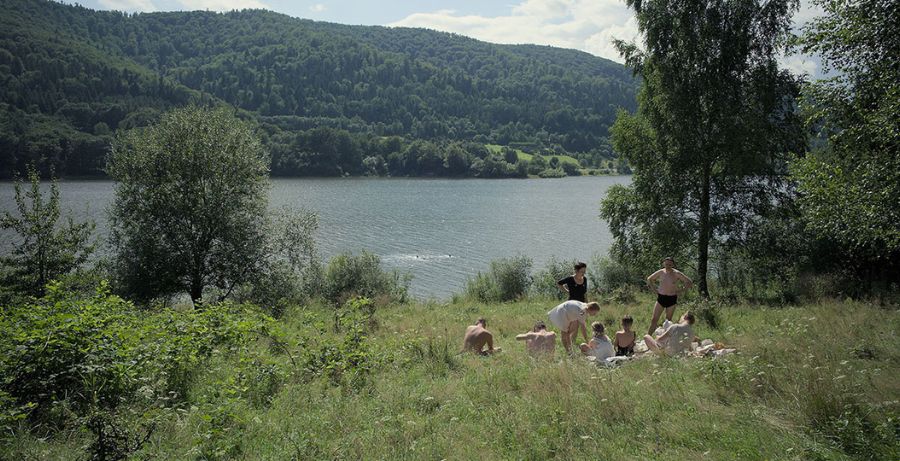Jonathan Glazer’s mortifying and powerfully restrained The Zone of Interest is one of the most damning portraits of human consciousness ever committed to celluloid and, by proxy, is one of the most important as well. It offers a truly unique perspective on the atrocities of the Holocaust, casting its historical lens in a more cerebral light, to peer into man’s psyche and excavate the inherent darkness that lies within. In doing so, Glazer calls our legacy into question, positing that our mark on the world is far from a positive one and that for every commendable act, there are an infinite number of ghastly ones primed to take its place.
Before we see the first frame of The Zone of Interest, the enveloping nature of evil is on full display. The austere title card fades to black, giving way to a terrifying, droning void (hauntingly scored by Mica Levi) that threatens to never end. It’s an opening that serves to chillingly transport viewers into an uncanny, oft-neglected perspective. Impressively, prior to the film properly beginning, with just a horrifying soundscape and a pitch-black screen, Glazer conjures emotions that are difficult to replicate in even the most visually stimulating of sequences. In its first few minutes, The Zone of Interest forces us to confront and attune to Glazer’s cold, idiosyncratic vision.
Viewers are plunked into the seemingly banal lives of Auschwitz Commandant Rudolf Höss (Christian Friedel), and his wife Hedwig (Sandra Hüller). The Höss home is one that is painterly and idyllic despite being a spitting distance from the infamous death camp’s walls. On one side is a family striving for domestic bliss, and on the other, some of the most harrowing atrocities ever are being perpetuated.
Yet Glazer, whose screenplay is very loosely adapted from Martin Amis’ novel of the same name, remarkably keeps the horrors at the recesses of the experience. Instead, he focuses on the mundanity of their daily lives, where the central conflicts related to maintaining a “paradise garden” or dealing with a promotion that might uproot the Höss family from their dream home—which is replete with children and a handful of Polish housemaids.
This extremely subtle approach, one that relinquishes more traditional, sensationalized depictions of the holocaust, elicits emotions that are much more powerful and bloodcurdling. In shying away from what countless other films have depicted, Glazer fills in cinematic blanks that have otherwise been ignored, cementing an experience that is far more unnerving than anything it could have chosen to show. Its enduring power lies in its restraint.

As Glazer’s cold, emotionally detached eye shows us Hedwig carrying on with her daily tasks, raising the children, and tending her garden, we are often reminded of the horrors that surround their picturesque home. We hear gunshots, muffled screams, and view billowing smokestacks in the background that play second fiddle to domestic inconveniences. These moments, in tandem with Levi’s garbled, deeply unsettling score, transform The Zone of Interest into a guttural, aural shocker that isn’t afraid to cut close to the bone—often shattering right through it. Yet, these moments are never overplayed but meticulous in their design, constantly wracking the mind with their unguarded jolts.
Glazer’s vision is one that is purposefully, and much effectively, bare-boned, dissecting and redefining how a holocaust story can be told. More overarchingly, The Zone of Interest sets its sights on indicting human nature rather than the Nazis, searingly capturing how evil can be rendered mundane as a daily task to complete, where discussing the efficiency of an incinerator is akin to a weekly budget meeting.
Much of the film’s power lies in its tortuously gorgeous cinematography, which is painstakingly crafted by Łukasz Żal. The compositions rarely move, manifesting as still-life paintings that hold unimaginable terrors outside its borders. The home is shot with a halcyonic edge, rendering it disquietingly close to an Eden of sorts during the day.
At night, Glazer uses negative film to cleverly invert the story, transforming secret, humane acts into alien occurrences and reverting to its colorful photography when it shifts back to the Höss household. It’s an impactful visual subversion that only gets stronger when Glazer drenches the frame in solid colors to highlight the inhumanity at the core of these very human characters.
Friedel’s earnest performance renders Höss uncomfortably relatable. Rudolf is never portrayed as a mustache-twirling savage; instead, he’s a man who reads his children’s bedtime stories and loves his wife’s smile. Simply, his natural acceptance of his station and life is what makes him a monster. Hüller also impresses with her natural turn as a woman who will do anything to preserve her dream life, quickly reminding servants what her husband can do to them if they make even the smallest of mistakes.
The Zone of Interest is a singular portrait of not only the horrors of the Holocaust but also the banality of evil. Its masterful, fourth-wall-breaking conclusion condemns the legacy of human consciousness and suggests that given the right circumstances, each member of the audience would be capable of the same despicable acts.
The Zone of Interest screened as part of the 2023 Toronto International Film Festival.
The Zone of Interest
-
Rating - 9.5/109.5/10
TL;DR
The Zone of Interest is a singular portrait of not only the horrors of the Holocaust but also the banality of evil. Its masterful, fourth-wall-breaking conclusion condemns the legacy of human consciousness and suggests that given the right circumstances, each member of the audience would be capable of the same despicable acts.







